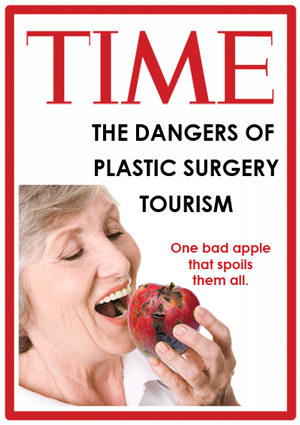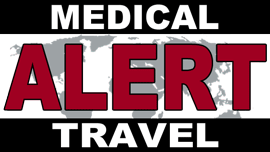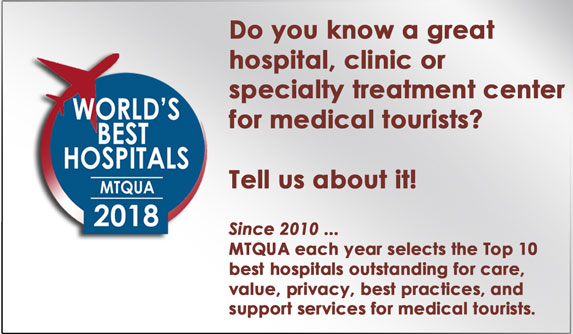 This summer, the warnings about bad medical tourism have been coming quickly, one after the other.
This summer, the warnings about bad medical tourism have been coming quickly, one after the other.
- Consumers need to know the risks of medical tourism. [1]
- Doctors need to be on the lookout for infections in patients undergoing surgery in foreign countries. [1]
- The Dangers of Plastic Surgery Tourism [2]
- When Tummy Tucks Go Bad [3]
- The dangers faced by people who travel for medical tourism [4]
Business as usual, some may say. Nothing new here.
It is a tragedy for medical tourism.
It seems no matter how much effort and how much money go into promoting a medical destination, the warnings about the dangers to medical tourists continue.
- Hospitals and clinics spend millions of dollars promoting their medical tourism services and investing in building international patient centers.
- Tourism offices make medical treatment a desirable option for tourists.
Why does this industry keep getting slammed about the risks that medical travelers are exposed to?
Revealing the risks of medical tourism
When a clinician of the status of Dr. Doug Esposito, a medical epidemiologist, warns that medical tourism is not fully revealing the risks of medical tourism to consumers, and advises doctors to beware when treating medical travelers for complications, should we not listen?
Dr. Esposito gave these warnings after completing a 3-year investigation for the U.S. Centers for Disease Control and Prevention (CDC) into an outbreak of a rapidly growing antibiotic resistant infection among medical travelers returning from the Dominican Republic. His report appeared in the August 2016 journal, Emerging Infectious Diseases.
 Medical travel advisory
Medical travel advisory
Eight months ago, in December 2015, MTQUA reported on the dangerous outbreak of infection in medical tourists after surgery they had in the Dominican Republic, and issued its first ever Medical Travel Advisory urging medical tourists not to seek treatment in the Dominican Republic until safety measures were taken.
The MTQUA report, based on much of the same data used by the Emerging Infectious Diseases journal, caused concern among some medical professionals in the Dominican Republic. Yet they were discouraged from taking action to improve conditions, being advised that the “problem” would go away if they just kept quiet about it.
They are not the only ones keeping quiet. Silence and sealed lips are the usual reaction by medical professionals and service providers whenever “things go sour” – that is, when a medical tourist dies, when one is disfigured, or another’s life is changed forever.
Whether a Burmese medical traveler in Thailand, a New Zealander in Malaysia, an American in Mexico, or a Chinese in Korea, local television reports and magazine stories convey the pain and heartbreak for a brief time.
But consumer outrage and media interest cool quickly and soon it’s back to business as usual.
MTQUA released its Medical Travel Advisory last December because the medical tourism industry for the most part treats adverse outcomes as “normal risk.”
Facilitators and hospital staff continue to shrug off any responsibility by resorting to the poor excuse that all surgery has risks.
Medical tourists are not ordinary patients.
Medical tourists are not subject to the same risks as patients treated in their local hospitals. They face significantly greater risks and more risks than people who stay at home for medical care.
By turning a blind eye to these greater risks and dangers, the medical tourism industry shows that it can’t be trusted, not by consumers and not by doctors.
To get the “real” story, consumers count on articles like the one in the July 2016 Time magazine about medical tourists putting themselves in danger when they have surgery in the Dominican Republic.
Dangers in plastic surgery tourism?
The article described the current problems experienced by medical travelers in the Dominican Republic. But it was not titled The Dangers of Plastic Surgery Tourism in the Dominican Republic. It did not identify the problems in the Dominican Republic as due to the lack of sanitation and infection standards, and poor government oversight.
Instead, the Time story was called The Dangers of Plastic Surgery Tourism, blaming the problems in the Dominican Republic that they wrote about on the act of traveling at all for surgery. According to Time, the problems were the fault of the entire medical tourism industry.
As an industry, when specific risks and dangers in a specific country are ignored, we subject the entire medical tourism industry to unfair criticism.
We wrongly spoil the reputations and hard work of some very exceptional and world-class facilities.
Certification and standards for the industry
MTQUA Medical Tourism Certification sets standards for hospitals, clinics and facilitators in many areas. Happily, it’s the top health care providers and the top service businesses that seek certification.
Some who would benefit from going through the MTQUA certification process seem reluctant to start because they don’t want to “fail,” even though no facility can fail as the process is designed to help them improve their operations, develop stronger protocols, and generally make them better stewards of medical tourism.
There are many who don’t see the value in applying common international standards, mainly because they don’t have any. They look for the easy road, or the cheapest road, to a certification. They are the rotten apples that are spoiling the industry for everyone else.
As an industry, we can choose to either clear away the two or three bad apples that spoil the barrel or leave them to ruin all the apples.
Do we continue to dismiss or ignore real problems in this industry that we see every day, or do we grit our teeth and deal with the problems that we know are there?
[1] Scientific American July 2016
[2] Time July 2016
[3] Scientific American July 2016
[4] Greenwall Foundation, describing new writing by Harvard professor Glenn Cohen

 >
>